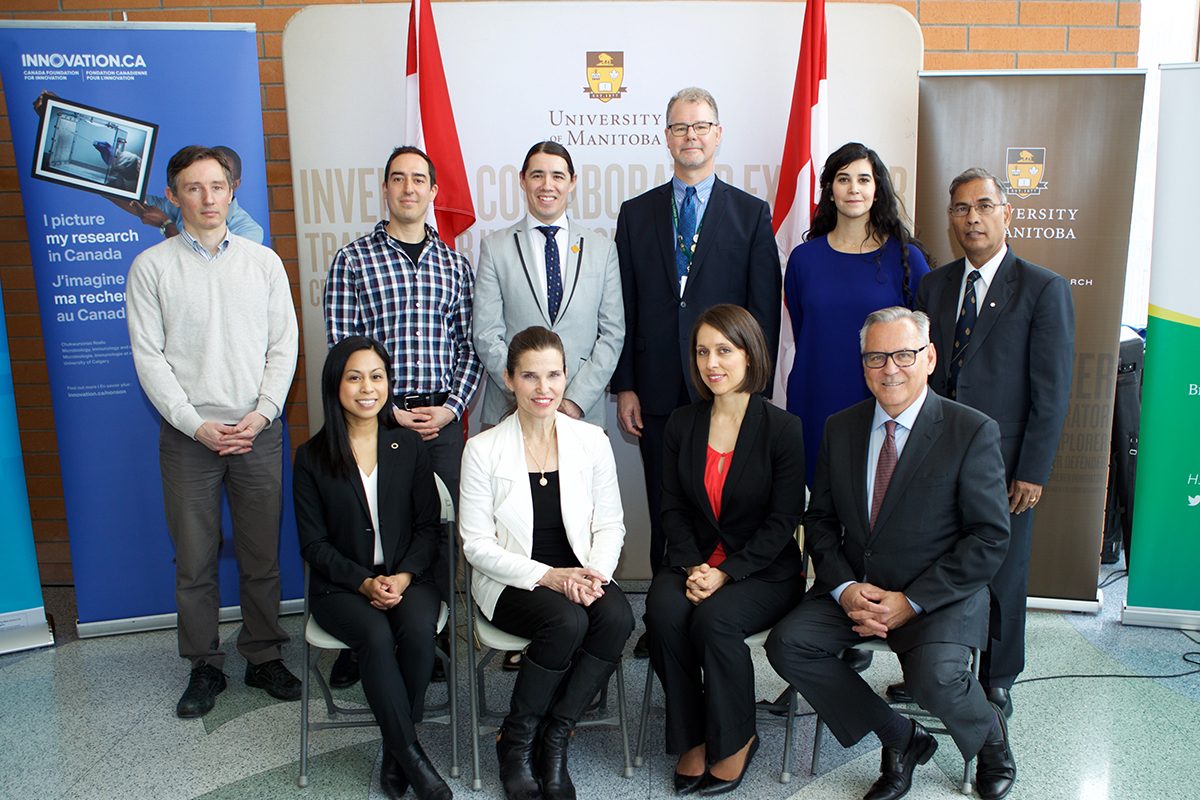
(front row, l-r): CRC Janilyn Arsenio (JELF recipient), Minister of Science and Sport Kirsty Duncan, CRC Meghan Azad (JELF recipient), Pierre Norman (CFI VP External Relations & Communications) (back row, l-r): JELF recipients CRC Marcelo Urquia and Gerd Prehna, MP Robert-Falcon Ouelette, Paul Wiebe (HSC), JELF recipient Filiz Koksel and VP Research and International at the U of M Digvir Jayas.
Seven U of M research projects funded by CFI
The Honourable Kirsty Duncan, Minister of Science and Sport, visited the University of Manitoba on March 14 to highlight more than $39 million for state-of-the-art research labs and equipment through the Canada Foundation for Innovation’s (CFI) John R. Evans Leaders Fund (JELF).
This investment will support 251 researchers leading 186 projects at 43 universities across Canada. JELF aims to help universities attract and retain top talent from around the globe by providing researchers with the highly specialized infrastructure they require to be leaders in their field.
“Since 1997, the Canada Foundation for Innovation has been ensuring Canadian researchers have the tools they need to push the frontiers of knowledge in all disciplines,” the minister said. “The stable, long-term funding we are celebrating today will help Canada continue to be an international destination for research and innovation.”
As part of this funding, the University of Manitoba is receiving more than $1.1 million in support of seven projects in areas such as disease, food processing and supercomputers. Dr. Janilyn Arsenio, for example, will use the funding to help with her research in developing new strategies for vaccine design and in improving the treatment of infections, cancer and autoimmune diseases.
“I congratulate these researchers on their exceptional work being recognized today with this new investment. The advancements they make will contribute to health and economic well-being in Manitoba and beyond,” says Digvir Jayas, Vice-President (Research and International) and Distinguished Professor at the University of Manitoba
The U of M recipients are:

Janilyn Arsenio
Janilyn Arsenio
Canada Research Chair in Systems Biology of Chronic Inflammation, Assistant Professor, Internal Medicine, Rady Faculty of Health Sciences, is receiving $156,834 for project titled: Single-cell transcriptomics analysis of the immune system during infection and chronic inflammation.
An effective immune system provides protection against infection and prevents immune dysregulation. Dysregulation can lead to conditions of chronic inflammation. This includes heightened immune responses in autoimmune diseases and transplant rejections, or to a loss of immune function (exhaustion) in chronic infections and cancer. This research aims to understand how single T cells become functional immune regulators. Single-cell transcriptomics will be used to define the molecular programs which form functional versus dysfunctional T cells during infection and conditions of chronic inflammation. Information from this research will be used to develop novel vaccines and immunotherapies to prevent and treat infectious and non-infectious diseases. Advancing single-cell systems based research in biomedicine to be transformative into the development of next generation therapeutic strategies to treat diseases will positively impact the economic, health, and training sectors in Canada.

Meghan Azad
Meghan Azad and Nathan Nickel
Azad is Canada Research Chair in Developmental Origins of Chronic Disease, Assistant Professor, Pediatrics and Child Health, Rady Faculty of Health Sciences and Scientist with Children’s Hospital Research Institute of Manitoba, is receiving $165,464 for project titled: Manitoba Interdisciplinary Lactation Centre (MILC): a provincial infant feeding database and human milk biorepository.
Nickel is assistant professor, community health sciences; Manitoba Centre for Health Policy, Rady Faculty of Health Sciences.

Nathan Nickel
Funds will be used to establish a new one-of-a-kind research centre: the Manitoba Interdisciplinary Lactation Centre (MILC). MILC will combine a provincial infant feeding database and a human milk biorepository that will be linked with a wealth of health and social services data at the Manitoba Population Research Data Repository.
MILC will provide unrivaled opportunities to conduct interdisciplinary research on the impact of policies on breastfeeding, the biology of human milk, and the influence of social factors on breastfeeding biology and behaviours.
Filiz Koksel
Assistant Professor, Food and Human Nutritional Sciences, Faculty of Agricultural and Food Sciences, is receiving $160,000 for project titled: Tailoring quality during processing of protein rich plant-based food materials.

Filiz Koksel
The proposed innovative research program aims to develop techniques to manufacture high quality plant protein-rich foods under a wide range of process conditions and to
formulate nutritionally dense and palatable foods with appealing, novel structures. Through value added processing of Canadian cereals and pulses into products such as meat extenders, meat analogs and protein-rich snacks, the findings of this program will increase the availability of healthy alternatives to animal-based foods. Trainees involved in this research will receive exceptional interdisciplinary training in food engineering and materials science, so they are skilled to non-destructively characterize and assess the structure and texture of foods and then be able to control food quality in real-time during processing.

Lyle McKinnon
Lyle McKinnon
Assistant Professor, Medical Microbiology and Infectious Disease with a cross-appointment in Community Health Sciences, Rady Faculty of Health Sciences is receiving $155,942 for project entitled: Enhancing capacity for cellular phenotyping for HIV prevention and cure research.
Understanding the underlying biology of virus entry at a mucosal level is believed to be key to designing better HIV prevention. This research will focus on defining the cellular determinants of HIV transmission and pathogenesis, with the goal of improving HIV prevention options that are available in the clinic. This research will lead to the training of personnel at multiple levels, from undergraduate students to principle investigators, including Canada’s future leaders in HIV prevention research. The benefits to Canadians and world-wide extend beyond fighting HIV, by increasing knowledge of immunology that is “taught by viruses” — advances in HIV have frequently provided insight into the host immune system that the virus attacks, shedding light on other medical conditions with an immunological basis.

Gerd Prehna
Gerd Prehna
Assistant Professor, Microbiology, Faculty of Science is receiving $159, 028 for project titled: High-yield Protein Production Suite for Structural Biology.
Gram-negative bacteria have evolved a macromolecular machine termed the type VI secretion system (T6SS) to communicate directly with each other, competing micro-organisms, and with eukaryotic hosts. The human gut flora use the T6SS to maintain a mutualistic relationship with their host, whereas pathogens such as Salmonella use it as a weapon. At the molecular level the T6SS is adaptable and modular to allow bacteria to perform numerous functions. As Salmonella species have multiple divergent T6SS adapted for specific hosts (human, chicken, reptile), the research program will investigate T6SS versatility in detail at the molecular level. A detailed molecular understanding of the Salmonella T6SS will not only reveal targets for the development of new antibiotics, but given its versatility further research could allow it to be developed into a tunable drug delivery system.

Robert Stamps
Robert Stamps
Professor and Head, Physics and Astronomy, Faculty of Science is receiving $114,046 for project titled: Desktop Supercomputers for the Design of Advanced Functional Materials.
This research will create a resource essential for the development of advanced functional materials. The focus will be on materials with potential to enable new opportunities for next generation energy efficient information and communication technologies, nanoscale sensing devices for biomedical applications, and novel quantum technologies. This research will provide needed computational tools for the design of next generation multifunctional and smart materials whose unique electric and magnetic properties do not exist in the current stockpile of material options. Useful models for the design and exploitation of these materials require a multi-scale modelling approach that poses enormous computational challenges. These challenges can be addressed with computational resources recently available in low-cost desktop platforms and moderate sized clusters made possible with accelerations using the multiple cores of high end graphics cards.

Marcelo Urquia
Marcelo Urquia and Alyson Mahar
Assistant Professors, Community Health Sciences and Manitoba Centre for Health Policy, Rady Faculty of Health Sciences is receiving $240,000 for the project titled: Social Determinants of Health Digital Library.
To effectively address the social determinants of health there is a need for richer information across sectors (combining information from health, education, social services, and the justice systems), a greater focus on families, and development of new analytic tools to optimize the use of the available data.

Alyson Mahar
Urquia and Mahar will create a laboratory to study these important contributors to health and well-being, bringing together new and existing data at the University of Manitoba with key stakeholders to support Canadians who face challenges to achieving optimal health. Urquia will focus on integration to Canadian society, gender equity initiatives, and navigating the health system for Canadian immigrant families working to support the development of solutions to issues affecting their well-being. Mahar will help strengthen Canadian Armed Forces families by studying the short and long-term effects of military service, including Post Traumatic Stress Disorders, following soldiers’ transition to civilian life. Her program will also work to ensure all Canadians have equal opportunity to benefit from advances in cancer treatment, especially marginalized populations.
Research at the University of Manitoba is partially supported by funding from the Government of Canada Research Support Fund.






